Supporting Stolen Generations Survivors
Empowering people to tell their stories and take charge of their own healing
The NIAA is administering the Territories Stolen Generations Redress Scheme in a survivor focused and healing informed way. The Scheme will give each eligible Stolen Generations survivor the opportunity to share their personal story about the impact of their removal to a senior representative within government and have the resulting trauma acknowledged. Truth-telling, being heard and being believed is a large part of the healing process.
Our Agency also provides funding to The Healing Foundation to support Stolen Generations and their families to tell their stories and be in charge of their own healing. This important work helps us to build respectful relationships with Aboriginal and Torres Strait Islander stakeholders and organisations.
During National Reconciliation Week 2021, Fiona Cornforth, CEO of The Healing Foundation, visited the NIAA to speak about what reconciliation means on a personal and professional level. It was a reminder that our everyday actions – building trusted relationships with communities, and designing and delivering programs that directly impact people’s lives – contribute to reconciliation.
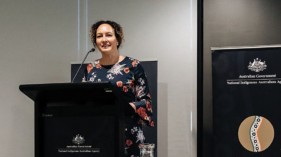
Fiona Cornforth, CEO of the Healing Foundation speaking to NIAA Staff during National Reconciliation Week 2021
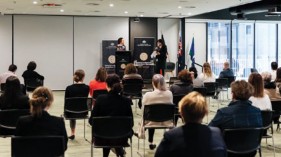
Cultural Immersion
Building respect through cultural learning and development
The Footprints program is the NIAA’s cultural learning and development framework. Footprints supports staff to continuously build and strengthen their knowledge and understanding of Aboriginal and Torres Strait Islander cultures, peoples and histories.
Under Footprints, NIAA staff are encouraged to participate in all kinds of learning activities from seminars and quizzes to discussion groups.
One activity offered to staff is the Jawun Secondment Program. Jawun is an initiative where corporate, government and philanthropic organisations come together with Indigenous people to make real change. It’s a unique opportunity for high performers to get out of their comfort zone and contribute to Indigenous-led projects across Australia.
Two NIAA staff members undertook a Jawun secondment in Mparntwe (Alice Springs) in 2021. Since returning to the NIAA, they’re applying what they learnt to their work in the Agency. For example, one staff member is using her increased cultural awareness to better support Indigenous staff in her HR role. ‘Around a quarter of NIAA staff are Indigenous, so I need to have a good level of cultural awareness,’ she said.
NIAA executive staff also participate in the Jawun initiative through Stories of Female Leaders – a network of 250 Indigenous and non-Indigenous women who are learning from each other.
Through these initiatives, NIAA staff continue to build respect for Aboriginal and Torres Strait Islander peoples and cultures.
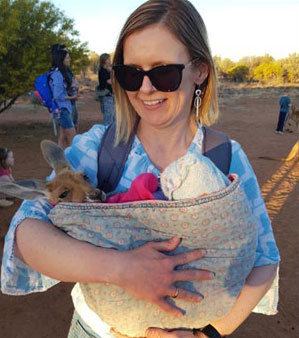
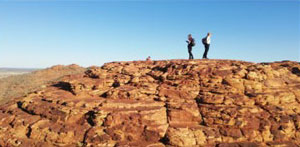
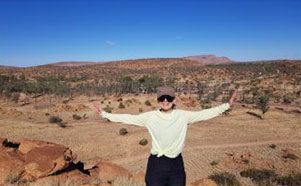
NIAA staff member Zoe Mansfield in Mparntwe (Alice Springs) on the Jawun Secondment Program.
Empowering Indigenous Managers
Improving Aboriginal and Torres Strait Islander employment outcomes
The NIAA supports up to 25 Aboriginal and Torres Strait Islander staff each year to undertake the ANU Management Program.
This program provides Indigenous APS employees with knowledge and skills in different management disciplines. It is an immersive learning experience requiring students to actively participate so that they emerge with skills – like complex decision- making and leadership – that they can apply in the workplace.
The NIAA partnered with the Australian National University (ANU) to launch the pilot program in February 2021. The first cohort completed their studies in December 2021 and received a Graduate Certificate of Management.
One staff member, who was part of the first intake, was so inspired by one of the ANU Management Program teaching faculty that he is now considering undertaking a law degree.
The ANU Management Program is helping to improve Aboriginal and Torres Strait Islander employment outcomes both within the NIAA and across the Australian Public Service. It’s an important part of our commitment to providing opportunities for Indigenous staff.
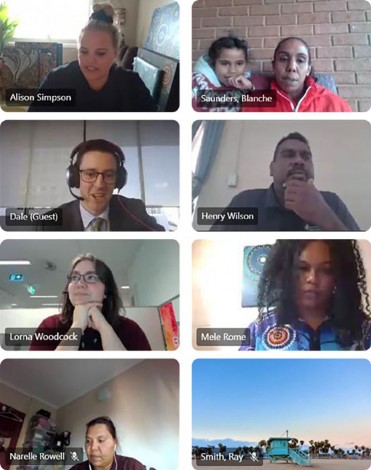
2021 ANU Management Program participants in a virtual class.
Reconciliation in Action
Working collaboratively to embed Reconciliation in our business
In 2020, the NIAA established a working group to develop the inaugural NIAA Reconciliation Action Plan (RAP).
Each Group across the NIAA nominated two staff, one was selected by the RAP Working Group (RAPWG) Co-Chairs as the member and the other staff-member was the Group’s proxy representative. The RAWPG was a real reflection of the strength and diversity of the NIAA with representatives from all groups and regions included and contributing to the RAP.
Members of the RAWPG had an important role in the development of the RAP. Members were expected to represent the NIAA, and were responsible for consultation within their respective Group. It is through this mechanism that strong deliverables were agreed for inclusion in the RAP.
The group met regularly and in the spirit of reconciliation will be refreshed following the launch of the RAP. The relaunched RAPWG will be responsible for continuing to promote the RAP, including implementing actions and working collaboratively to address challenges encountered. All involved have demonstrated their commitment to reconciliation.
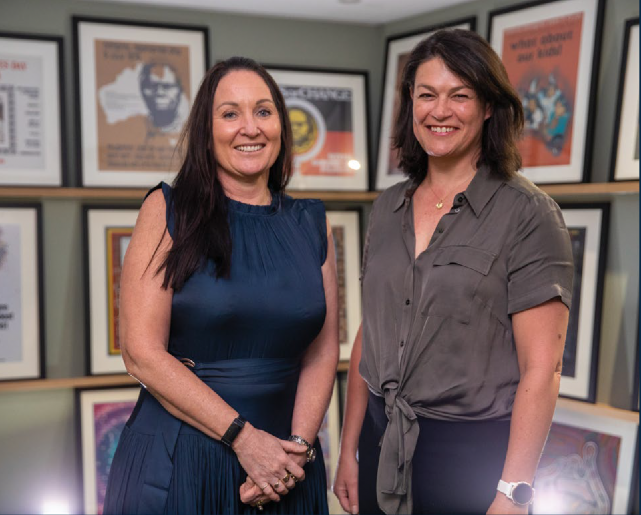
RAPWG Co-chairs, Ms Andrea Kelly and Ms Rachael Jackson